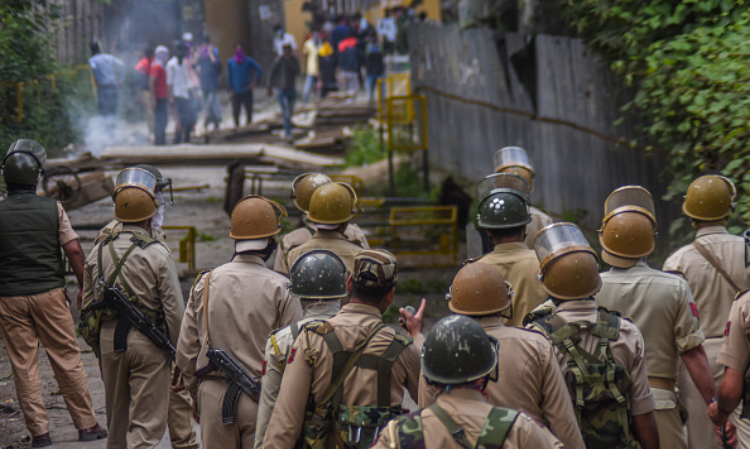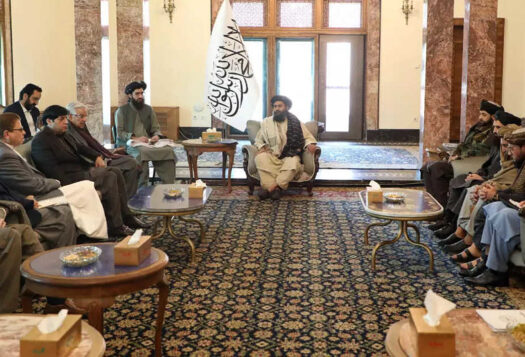
Resolving the Kashmir issue is a herculean task that should be jointly considered by state, non-state, and international actors if negotiations are to lead to a lasting and satisfactory outcome. Although constructive dialogue is critical to establishing peace in Kashmir, and India and Pakistan have previously appointed interlocutors to conduct peace talks, these attempts have yet to bear fruit.
In 2001 and 2003, the Indian government under Prime Minister Attal Bihari Vajpayee appointed KC Pant and NM Vohra as negotiators between the Indian state and various local actors and separatist groups. In 2010, Manmohan Singh appointed a trio of interlocutors to restart the peace process but ultimately the interlocutors did not have a clear political mandate and New Delhi largely ignored the group’s recommendations to reduce the Indian army’s presence in Kashmir and review the Armed Forces Special Powers Act.
Last month, the Bharatiya Janata Party (BJP)-led government under Narendra Modi changed its “hawkish policy” and appointed Dineshwar Sharma, former director of the Indian Intelligence Bureau, as its interlocutor. Sharma has been granted the “rank and status” of a Cabinet Secretary and will have full authority to decide his agenda. Apart from Kashmir, Sharma is also the government’s interlocutor with three factions in India’s Northeastern states.
Pakistan rejected Sharma’s appointment stating that the move did not appear “sincere and realistic.” Interestingly, Sharma’s appointment was announced on a day recognized as Independence Day in Pakistan-administered Kashmir, marking the end of Hindu Dogra rule in Kashmir.
While the appointment of an interlocutor can be viewed as a positive, diplomatic signal from New Delhi, attempts to resolve the Kashmir dispute must move beyond simple gestures of goodwill. If such talks are to lead to lasting results, the government of India should recognize certain challenges in relying on interlocutors alone, as outlined below, and adjust its strategy accordingly. Above all, the Indian government should empower its interlocutor to consult with a broad variety of stakeholders—including the Pakistani government and separatist groups—to identify a lasting solution acceptable to all parties.

Challenges to Proactive Dialogue
A resurgence in instability and unrest in Kashmir began after the July 2016 killing of Hizb ul Mujahedeen commander Burhan Wani. Wani’s death triggered protests and clashes between civilians and Indian security forces, resulting in the deaths of over 82 people. This year is now on track to be “most violent year” in Kashmir with 184 incidents of violence as of August.
Addressing this situation may be beyond the capacity or authority of a typical interlocutor and requires bringing all stakeholders, including separatist groups and the Pakistani government, to the table. Previous interlocutors were criticized for meeting with only a few groups while neglecting the Hurriyat Conference, an amalgamation of Kashmiri separatist parties, and Pakistan. Since his appointment, Sharma has met with over 30 delegations but Hurriyat members and prominent trade bodies have remained notably absent. Indeed, the Hurriyat Conference has refused to meet with Sharma though Sharma has hinted at his hope to meet with the group. As such, it remains unclear how deeply Sharma intends to engage with politically challenging stakeholders whose presence is nevertheless required to conduct a true dialogue.
Beyond simply meeting with various stakeholders, the diametrically opposed views held by different stakeholders also present a challenge to negotiations. What previous interlocutors have offered has often not met the demands of the majority of Kashmiris. For example, the Jammu Kashmir Liberation Front and All Parties Hurriyat Conference, which as the face of separatist politics in Kashmir still enjoys considerable popular support, envision an independent, sovereign Kashmiri state.
Likewise, the longstanding, opposing positions of Indian and Pakistani governments is also well-known. India is averse to accept international arbitration related to Kashmir or the inclusion of Pakistan in a peace dialogue given that it views the situation in Kashmir as an internal, domestic issue. Conversely, Pakistan views the Kashmir issue as a humanitarian crisis and freedom movement requiring international intervention. In this environment, it will be the challenge of India’s interlocutor to find the balance between seeking broad consultations and retaining Indian control over the process. However, if Sharma wants to succeed where other interlocutors have failed, he will need to incorporate the views of a variety of stakeholders, even antagonistic ones, and offer a path forward.
Promoting a Kashmiri-centric dialogue
Bringing the right actors to the table and identifying common ground is only half the battle when it comes to the Kashmir peace process. Authorities must also center the rights and grievances of Kashmiris in their work. While any dialogue between India and Pakistan would be a welcome sign at the current low point in bilateral affairs, these talks will ultimately be fruitless unless they confront the Kashmir issue head-on and take into account the interests of the Kashmiri people. If this conflict is ever to be truly solved, inclusion of the Kashmiri people, as well as their political groups, is a must.
Second, displays of military force from India through the use of dangerous rubber and metal pellets to crush popular protests have typically only inflamed tensions in the valley. Even while Sharma’s appointment is a good sign, Indian Army Chief Bipin Rawat insists it will have no effect on ongoing military operations in Kashmir and that such operations contribute to India’s “position of strength” in negotiations. Such a strong-armed response is likely a major hindrance in initiating a meaningful dialogue with the Kashmiris. Any comprehensive dialogue must be based on the principles once articulated by BJP stalwart Vajpayee: Kashmiriyat, Jamhooriyat, and Insaniyat (Kashmir, Democracy, and Humanity).
As such, the Indian government should prioritize the “force of argument” rather than the “argument of force” in Kashmir. Given the complexities of the Kashmir conflict, it is clear that an interlocutor, no matter how talented, is an inherently limited option to address the crisis at hand. Rather, the Indian government should seek to empower its interlocutor to conduct a wide-ranging dialogue that includes all the relevant parties to address the underlying causes of Kashmir conflict and establish an enduring peace.
***
Editor’s Note: Click here to read this article in Urdu; click here to read this article in Hindi
Image 1: Yawar Nazir via Getty Images.
Image 2: Yawar Nazir via Getty Images.


